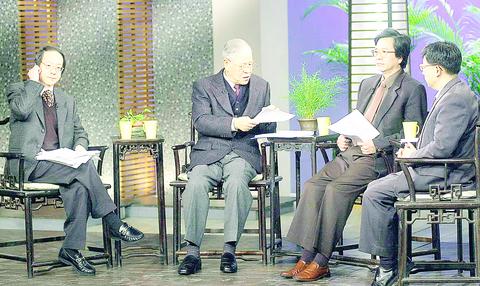Former president Lee Teng-hui (
Given that the war is over, the Temporary Provisions Effective During the Period of Communist Rebellion (

PHOTO: SEAN CHAO, TAIPEI TIMES
Lee also rejected the existence of the so-called "1992 consensus," which states two sides agree that there is "one China, with each side having its own interpretation."
While the KMT has urged the government to use the consensus to resume cross-strait dialogue on technical matters while temporarily shelving political issues, the DPP has questioned the existence of such a consensus.
Lee, who was leader of the country at the time the so-called consensus was reached, denies the KMT's claims.
"There is no such thing. Even I know nothing about it. What the KMT claims is utterly irrelevant as it is not a ruling party," Lee said.
The former president sought to shed light on the controversial notion and state the importance of forging a clear national identity while taking part in a program on TTV held by Chin Heng-wei (
Lee took the opportunity to pay his respects to late president Chiang Ching-kuo (
Dubbing Chiang "a remarkable political leader," Lee said Chiang had set the foundation for Taiwan's democratic development and it would be unfair for him alone to receive all the credit.
Lee said he had learned a lot about how to rule the country from Chiang and had vowed to adhere to his principles when he took over the presidency in 1988.
He said the concept of "New Taiwanese" was introduced as a result of Chiang's influence because, though a mainlander, Chiang had always considered himself Taiwanese.
On Sunday Lee said Chiang was seeking to consolidate his power when he started to recruit native Taiwanese in the government in the 1970s.
As one of Chiang's targets, Lee said he "felt used" when serving as a minister without portfolio.
Lee said yesterday that he didn't mean to criticize Chiang.
In the early 1970s, then-premier Chiang carried out a policy of recruiting a large number of younger Taiwanese into the KMT and the government, which was then dominated by old-guard KMT exiles from China.
The movement indirectly triggered the onset of localization in the KMT.
Political leaders such as Lee, KMT Chairman Lien Chan (連戰), former Judicial Yuan president Lin Yang-kang (林洋港) and former Judicial Yuan president Shih Chi-yang (施啟揚) are among the group.

The High Prosecutors’ Office yesterday withdrew an appeal against the acquittal of a former bank manager 22 years after his death, marking Taiwan’s first instance of prosecutors rendering posthumous justice to a wrongfully convicted defendant. Chu Ching-en (諸慶恩) — formerly a manager at the Taipei branch of BNP Paribas — was in 1999 accused by Weng Mao-chung (翁茂鍾), then-president of Chia Her Industrial Co, of forging a request for a fixed deposit of US$10 million by I-Hwa Industrial Co, a subsidiary of Chia Her, which was used as collateral. Chu was ruled not guilty in the first trial, but was found guilty

DEADLOCK: As the commission is unable to forum a quorum to review license renewal applications, the channel operators are not at fault and can air past their license date The National Communications Commission (NCC) yesterday said that the Public Television Service (PTS) and 36 other television and radio broadcasters could continue airing, despite the commission’s inability to meet a quorum to review their license renewal applications. The licenses of PTS and the other channels are set to expire between this month and June. The National Communications Commission Organization Act (國家通訊傳播委員會組織法) stipulates that the commission must meet the mandated quorum of four to hold a valid meeting. The seven-member commission currently has only three commissioners. “We have informed the channel operators of the progress we have made in reviewing their license renewal applications, and

‘DENIAL DEFENSE’: The US would increase its military presence with uncrewed ships, and submarines, while boosting defense in the Indo-Pacific, a Pete Hegseth memo said The US is reorienting its military strategy to focus primarily on deterring a potential Chinese invasion of Taiwan, a memo signed by US Secretary of Defense Pete Hegseth showed. The memo also called on Taiwan to increase its defense spending. The document, known as the “Interim National Defense Strategic Guidance,” was distributed this month and detailed the national defense plans of US President Donald Trump’s administration, an article in the Washington Post said on Saturday. It outlines how the US can prepare for a potential war with China and defend itself from threats in the “near abroad,” including Greenland and the Panama

Taiwan People’s Party (TPP) Chairman Huang Kuo-chang (黃國昌) yesterday appealed to the authorities to release former Taipei mayor Ko Wen-je (柯文哲) from pretrial detention amid conflicting reports about his health. The TPP at a news conference on Thursday said that Ko should be released to a hospital for treatment, adding that he has blood in his urine and had spells of pain and nausea followed by vomiting over the past three months. Hsieh Yen-yau (謝炎堯), a retired professor of internal medicine and Ko’s former teacher, said that Ko’s symptoms aligned with gallstones, kidney inflammation and potentially dangerous heart conditions. Ko, charged with